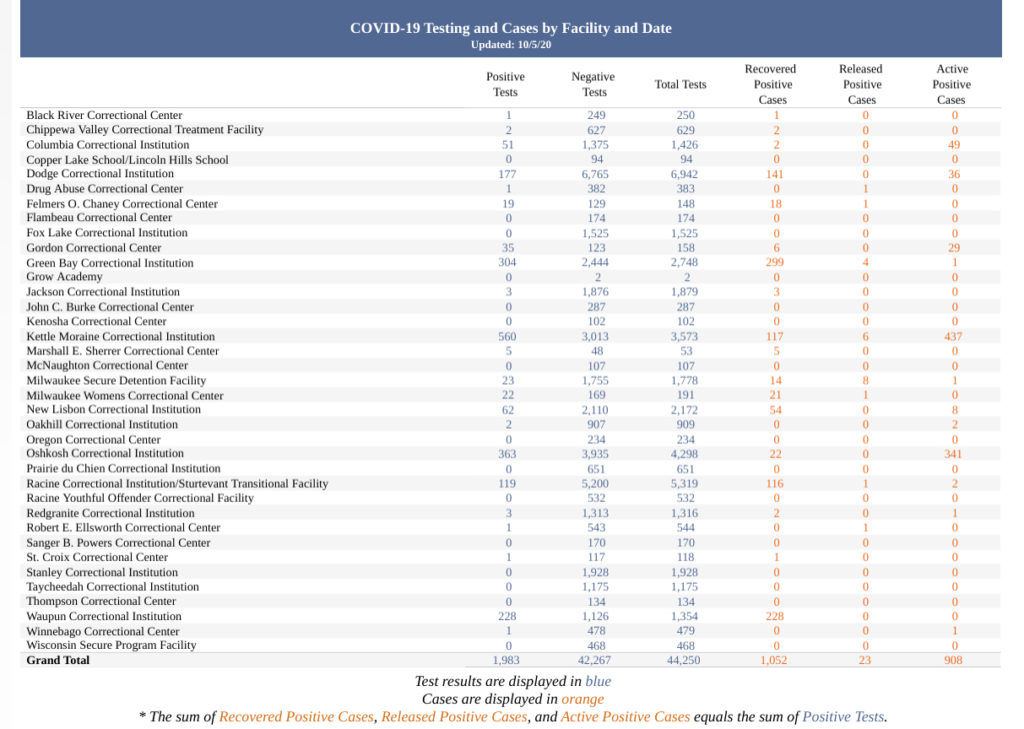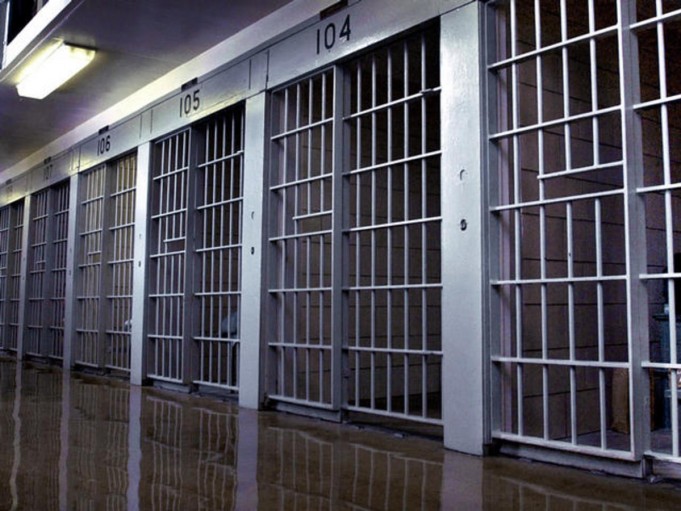In Wisconsin, COVID-19 cases are spiking at an incredible rate and the state now ranks third behind only Texas and California in terms of total new cases in the last seven days, according to data from the Centers for Disease Control. In fact, the state of Wisconsin now has more people in ICU with COVID-19 than the entire country of Canada.
It’s a huge concern for Wisconsin’s prison population, where positive coronavirus tests are on the rise, too. WISDOM/EXPO and their statewide affiliates and allies, in particular, have been pressuring Governor Tony Evers to release specific populations from Wisconsin prisons to protect against COVID-19.
“COVID-19 has given the governor a great opportunity to use special circumstances to release the most vulnerable in our prisons, including the elderly, immunocompromised and those with chronic health conditions,” says David Liners, statewide director of WISDOM, in a statement. “These are people who are not a danger to the public in any way, shape or form. Keeping somebody who is elderly or ill in prison during a pandemic just seems vindictive; it does not seem like justice.”
WISDOM is a statewide network of faith communities working to promote the common good by building diverse communities and encouraging broad participation in the democratic process. EXPO – for Ex-Prisoners Organizing – is the name of WISDOM’s formerly-incarcerated leaders, who work to end mass incarceration, eliminate all forms of structural discrimination against formerly incarcerated people, and restore formerly incarcerated people to full participation in the life of our communities.
Kettle Moraine Correctional Institute is the latest prison to have a major outbreak of COVID 19 with 560 people in their care testing positive as of Monday, Oct. 5. Green Bay, Dodge, Waupun and Racine Correctional Institutions have all had serious COVID outbreaks. The total number testing positive for COVID in Wisconsin correctional facilities is now just shy of 2,000.

“Dane County did an excellent job depopulating the Dane County Jail due to COVID. But the governor has remained silent on COVID in prison. Absolutely silent. These are people under his care. The government has the complete ability to commute sentences without having to go through the Supreme Court or legislation or judges,” Rachel Kincade, president of Madison Organizing in Strength, Equality, and Solidarity (MOSES), tells Madison365.
MOSES, an affiliate of WISDOM, is a non-partisan interfaith organization that works to promote social justice with a focus on ending mass incarceration. WISDOM/EXPO has been asking since March 19 for the release of people from Wisconsin prisons who are eligible for Compassionate Release, who have less than one year left to serve on crimeless revocation and Old Law Parole individuals who have a release date within the next year.
“We’re not asking for a whole lot, we just want the governor to act. These prisons are overcrowded and as you can imagine when you have people in tight spaces it is tough. You have 50 employees at Kettle Moraine that are positive, 46 in Green Bay and 39 in Dodge and 20 in CCI [Columbia Correctional Institution],” Kincade says. “You have to remember that these spikes in COVID that we are seeing in these different communities, people who are in prison are counted as residents of those communities and then you have the guards bringing it in and back out – and you see spikes in the community.”
Kincade shared letters with Madison365 from different people in prison in the Wisconsin Correctional System who are very fearful of the spread of COVID-19 and the ensuing lockdowns that have been happening as a result.
“The TCI [Taycheedah Correctional Institution] prison is using the coronavirus as an excuse to lockdown the prison which they are taking advantage of the issue claiming they can’t confirm or deny the case, so we’re being punished as a means to not wanting to deal with inmates,” wrote one incarcerated individual. “It’s not like we get to do a whole lot in prison, anyway, so next week we’ll still be on lockdown. The system is certainly aware of the issue but refuses to do anything about it. If the correctional officer isn’t wearing their mask but enforcing the rules, why should we suffer? They are the ones bringing the virus in. Some of us inmates have major health issues and they don’t seem to give a crap.”
Kincade notes that Wisconsin is one of the worst states for incarcerating its citizens and among the top states for racial disparities in the prison system. Health experts have warned that prisons are among the most dangerous places for the spread of coronavirus.
“From the very beginning, people have been telling me, ‘We weren’t sentenced to death.’ The fear is real that once it starts spreading in overpopulated prisons with people who are in close spaces together, it becomes very hard to manage,” she says.
The Wisconsin Department of Corrections released nearly 1,600 inmates, through the Earned Release Program (ERP), earlier this year to help address the COVID-19 crisis, according to the Wisconsin State Journal.
The Wisconsin DOC has limited authority to release people before their mandatory release dates, DOC spokesman John Beard tells Madison365, and the tools they have that have been reported on – like Certain Earned Release and Extraordinary Health/Geriatric Release – have eligibility requirements that limit the number who are qualified.
“We have released some people using those tools since the start of the pandemic, but it is important to note they had to meet all of the eligibility requirements and would have been eligible for release through those mechanisms even if there was no public health emergency,” Beard tells Madison365. “At the onset of the pandemic, the DOC worked to reduce the number of individuals being held in county jails for violation of supervision and those serving short-term sanctions in those jails.”
Beard also notes that 23 of the 37 correctional institutions have had two or fewer positive tests among persons in their care since they started tracking in mid-March. And 17 have never had a positive case as of Monday.
“Probably the best thing we can do is continue our partnership with the Wisconsin National Guard to test at our facilities. This helps us identify potential outbreaks,” Beard says. “It also helps us get a truer number of those infected and exposed, because some can be asymptomatic or pre-symptomatic. Once we have that truer number, we can isolate those with positive cases and quarantine those exposed to the best of our abilities.
“We also continue to emphasize the importance of proper hand-washing and the effectiveness of face coverings in limiting the spread of the virus. Mask mandates remain in effect at our institutions,” he adds. “Early in the pandemic, all DOC locations established updated cleaning protocols with an emphasis on sanitizing high-touch surfaces and routine cleaning of critical areas. Also, the DOC has been providing alcohol-based hand sanitizer in institution common areas for use by both staff members and persons in our care.”
Kincade says she is worried about reports she hears from prisoners of guards not sanitary-focused as they need to be, especially when it comes to masking up.
“Who is bringing it into the institutions? I know that [Wisconsin Department of Corrections] Secretary [Kevin] Carr has mandated that guards wear protective gear and yet I can hear reports from people like at CCI that guards are not wearing the masks they are supposed to be wearing,” Kincade says. “So they put not just the people in prison in jeopardy, but other guards and prison staff and then back out into the community. It’s coming from the community and going back out into the community.”
Commuting sentences to release people from jail, Kincade says, would create a prison system capable of allowing for social distancing and assist in ending the overcrowding that has plagued Wisconsin’s prison system for years.
“We saw this happening and we knew this was inevitable in March and we’ve been putting pressure on the governor through many calls to action, through a caravan to his mansion and other ways to start commuting sentences,” Kincade says. “He has the power and he’s not doing it. So, what it’s going to take is the political will to do this.
“We know where the Republicans stand on this so it’s really about putting pressure on the Democratic senators to put pressure on Gov. Evers from his own party to act on this,” she adds. “There have been no formal statements from the governor whatsoever. Prior to being elected, he vowed to decrease the prison population. Now that we have COVID, he has an absolute opportunity to start working on his campaign promises.”




























